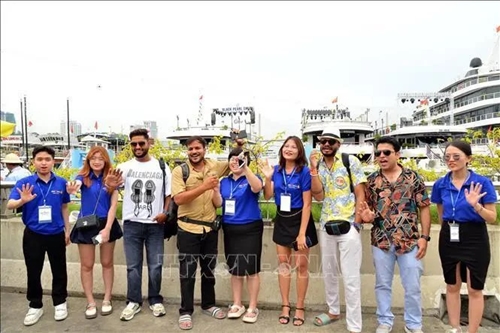He told the Vietnam News Agency that the year was particularly distinguished by Prime Minister Pham Minh Chinh’s landmark visit to India, the first by a Vietnamese Government leader in a decade, which yielded substantial economic and trade cooperation results.
    |
 |
|
Indian visitors to Ha Long Bay, Quang Ninh province |
The visit’s highlights included a business forum that attracted more than 300 Indian enterprises, including many giants like Adani and HCL expressing strong investment interests in Vietnam. The two countries signed various economic and trade collaboration agreements to deliver on their “five better” strategy.
Two-way trade is expected to exceed USD 15 billion this year and even USD 20 billion in the coming time, he said, adding the Vietnam Trade Office in India has been instrumental in driving the target through a multitude of trade promotion activities, including the “Vibrant Gujarat” program that featured an exhibition and a business forum, a five-day fair in Uttar Pradesh – a state boasting huge economic cooperation potential with Vietnam, and a Vietnam cuisine week.
Tourism, he said, saw remarkable growth, with the number of Indian visitors to Vietnam increasing three to four-fold, potentially reaching 500,000 - 600,000 tourists in 2024. India is now in Top 6 regarding the visitor number to Vietnam, significantly contributing to the domestic economy.
Thuong described investment as another bright spot in the bilateral ties. He elaborated that VinFast's groundbreaking USD 2 billion investment in India, the first 100% Vietnamese-owned enterprise to make such a substantial investment in the country, is a milestone in the five-decade cooperation between the two countries.
Regarding challenges in the bilateral economic - trade ties, he said they stem from many countries' protection measures, including India’s application of stringent standards on imports, requiring Vietnamese firms to make meticulous preparation before accessing global markets. Another challenge is the passive approach of Vietnamese businesses in exploring market entry opportunities in India. Despite extensive support from the trade office, some Vietnamese companies have still demonstrated insufficient proactive engagement in market exploration.
Looking ahead to 2025, Thuong said both countries see promising opportunities in strengthen their collaboration in such emerging sectors as digital economy, green technology, semiconductor and AI. The complementary strengths of their startup ecosystems present exciting cooperation prospects.
He pointed out that agriculture, renewable energy, and nuclear energy technology are potential areas for cooperation, adding they can work together to navigate global economic headwinds and learn from each other’s experience.
With a view to strengthening economic - trade links between the two countries, the Vietnam Trade Office has proposed negotiating a bilateral free trade agreement (FTA), considering it a crucial mechanism for breakthrough cooperation, especially in the context that India is requesting to review the existing ASEAN-India Trade in Goods Agreement.
For a breakthrough in their economic - trade ties, the two countries need their own cooperation mechanisms and policies, the counsellor said, describing an FTA as the key to this success.
Source: VNA